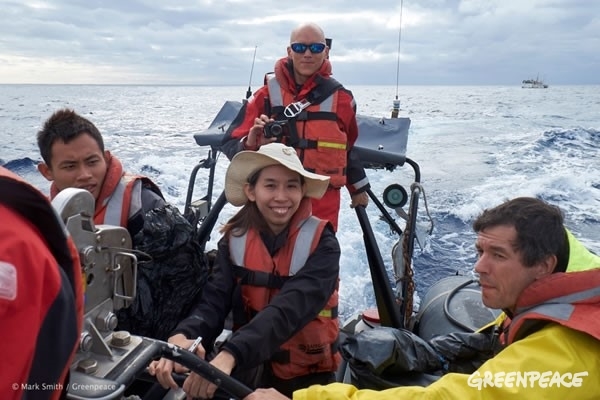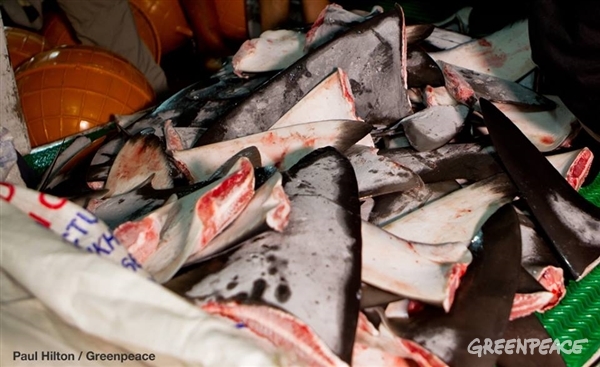
On Wednesday 9 September, on the vast waters of the Pacific Ocean, not far from Papua New Guinean water, I and an international crew of Greenpeace campaigners aboard the Rainbow Warrior made contact with a small Taiwanese tuna longliner, the Shuen De Ching No.888. Our mission over these last two months had been to observe and document these busy fishing waters for illegal fishing and illegal catches, which in the murky world of the Pacific tuna fisheries are far too common. We already knew that this vessel was not on the white list of the Western and Central Pacific Fisheries Commission (WCPFC), the organisation which manages fishing for tuna and other species. At the time, however, the Taiwan Fisheries Agency had not confirmed the status of the boat. Feeling suspicious, we requested permission to board. To our surprise, the captain and staff welcomed us aboard. Here is what we found, and the events which unfolded after.
The Pacific Ocean bears the burden of 70% of the world’s tuna consumption. Its waters contain riches, which are a source both exploited by profiteering fishing companies and relied upon for basic nutrition by millions of people. Moreover, the riches the ocean contains are far from boundless. They are part of a complex and delicate ecosystem, which unsustainable fishing can fast ruin.

The Rainbow Warrior was on the lookout for tuna longliners, whose lines can be over 100km long and hold thousands of hooks, many of which do not only catch tuna but also accidentally catch endangered species such as shark, sea turtles and many thousands of sea birds. Among these, shark, whose fins are prized as a delicacy across much of the Chinese world, are extremely valuable. For this reason some vessels deliberately and illegally target shark.
Once on board the Shuen De Ching No.888 we looked through the boat’s catch log. It was clear immediately that something wasn’t right. A longline boat like the Shuen De Ching No.888 can expect to catch at least half a tonne every time they set their lines. This boat had been at sea for over two months, and yet the catch log reported only three tonnes of fish. The captain explained that they were simply inexperienced and unlucky, but this was hard to believe.

We requested to take a look at the frozen catch below. There we weighed several fish and found major discrepancies with the catch log record. When we had almost finished, we noticed one sealed off door, hidden behind the piles of fish we had been weighing. Our interest was naturally stoked and we requested to see what was inside.
On opening the door we found what all the mysteries of the ship had been designed to obscure, a 75kg haul of shark fins and tails from at least 42 sharks.
Before we left the boat, I informed the captain that we had not found registry of the Shuen De Ching No.888 in the WCPFC records. This means that the vessel was operating without a permit and illegally. I also told the captain that the blatant inconsistency of the logbook and the hidden shark fin catch was a violation of Taiwanese fishing regulations, and that we were going to report these findings to the Taiwan Fisheries Agency and the WCFPC.

To our surprise, the very next day, the WCPFC informed us that the Shuen De Ching No.888 had been put on the white list, and not long after that the Taiwan Fisheries Agency informed us that the Shuen De Ching No.888 was now operating with a valid permit. On Sep 12, the Fisheries Agency contacted us again with information demonstrating that the Shuen De Ching No.888’s unregistered status was due to mistakes made during the process of the official listing.
GPEA notes, however, that the Taiwan Fisheries Agency holds responsibility to ensure such errors do not occur. Moreover, the vessel should never have been allowed to leave port without first being officially listed.
The activities of the Shuen De Ching No.888 expose a number of serious issues. Firstly, too many boats are operating outside of the law and using the damaging and unsustainable method of long line fishing to catch endangered species. Secondly, the Taiwanese Fisheries Agency’s negligence has shown that the efforts being made to regulate this industry are insufficient.
Strict regulation of the industry is the only way to protect the Pacific Ocean and its ecosystem, one of the world’s most precious resources. Oceans are vital sources of food and income for tens of millions of people all around the world. They are also critical for a healthy, balanced, environmentally stable planet. The crew of the Rainbow Warrior are committed to do everything we can to contribute to making the fishing industry sustainable and protecting the world’s oceans.
By Yen Ning, GPEA Ocean’s Campaigner
